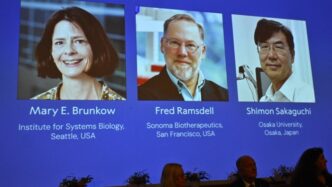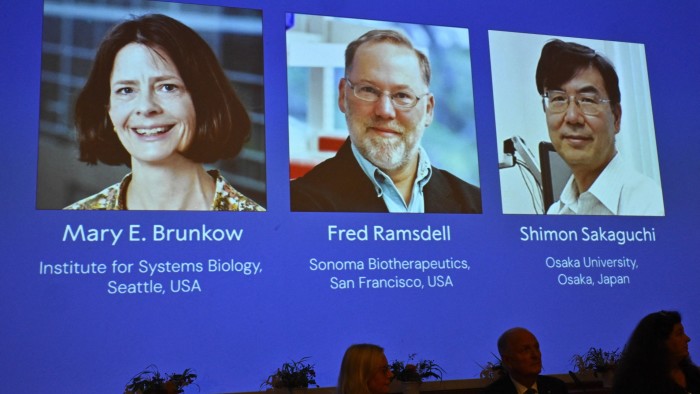American researchers Mary E. Brunkow and Fred Ramsdell, along with Japan’s Shimon Sakaguchi, have been awarded the 2025 Nobel Prize in Medicine for their groundbreaking discoveries on how the immune system regulates itself and prevents autoimmune diseases.
Gatekeepers News reports that the Nobel Committee said the trio were honoured “for their discoveries concerning peripheral immune tolerance,” explaining that their work “has laid the foundation for a new field of research and spurred the development of new treatments, for example for cancer and autoimmune diseases.”
Their research, the committee added, may also pave the way for more successful organ transplantations.
Sakaguchi, 74, made the first major discovery in 1995, challenging the long-held belief that immune tolerance only arises from the elimination of harmful immune cells in the thymus — a process known as central tolerance.
He revealed that the immune system was far more complex, identifying a previously unknown class of cells that prevent the body from attacking itself.
Brunkow, born in 1961, and Ramsdell, 64, expanded on that work in 2001 by discovering that certain mice highly prone to autoimmune diseases carried a mutation in a gene they named Foxp3.
“They also showed that mutations in the human equivalent of this gene cause a serious autoimmune disease, IPEX,” the Nobel jury noted.
Two years later, Sakaguchi linked the discoveries, establishing the connection between regulatory T cells and the Foxp3 gene — a breakthrough that transformed modern immunology.
The laureates will each receive a diploma, gold medal, and a $1.2 million award from Sweden’s King Carl XVI Gustaf at the Nobel Prize ceremony on December 10, marking the anniversary of Alfred Nobel’s death in 1896.
Concerns Over US Science Funding
While American researchers continue to dominate Nobel science awards, experts warn that the country’s leadership in global research could be at risk due to sweeping federal budget cuts.
According to the independent database Grant Watch, the US National Institutes of Health (NIH) has this year terminated over 2,100 research grants worth $9.5 billion and contracts valued at $2.6 billion, following cost-cutting measures under President Donald Trump.
Thomas Perlmann, secretary-general of the Nobel Committee for Medicine, told AFP that it was “no coincidence that the US has by far the most Nobel laureates,” but cautioned that “there is now a creeping sense of uncertainty about the US’ willingness to maintain their leading position in research.”
Calling the US “the very engine of global scientific research,” Perlmann warned that “it doesn’t take very many years of large cutbacks to cause irreversible harm.”
Trump, meanwhile, has made no secret of his ambition to win a Nobel Prize himself — the Peace Prize — though experts say his chances are slim.
“It’s completely unthinkable,” said historian Oeivind Stenersen, co-author of a book on the Nobel Prizes.
“(Trump) is in many ways the opposite of the ideals the Nobel Prize represents,” he added, citing Trump’s “America First” policies and rejection of multilateralism.
Nobel Season Continues
The 2025 Nobel season continues this week with the Physics Prize announcement on Tuesday, followed by Chemistry on Wednesday, Literature on Thursday, Peace on Friday, and Economics on Monday, October 13.
Among potential Peace Prize contenders are Sudan’s Emergency Response Rooms (ERR) — volunteer networks helping civilians survive war and famine — as well as press freedom groups such as the Committee to Protect Journalists and Reporters Without Borders.
Yulia Navalnaya, widow of late Kremlin critic Alexei Navalny, is also among the bookmakers’ favourites.













